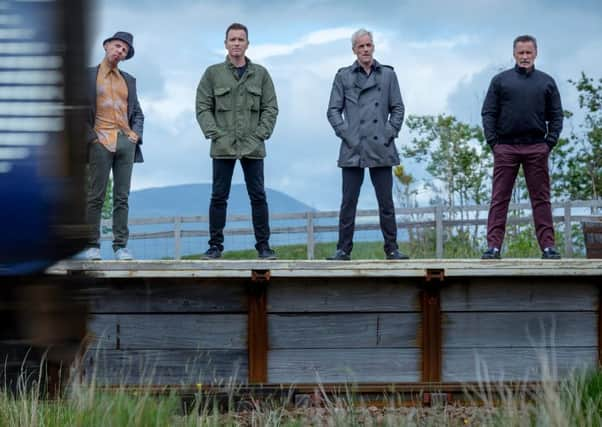Film review: T2 Trainspotting


T2 Trainspotting | Rating: ***
Directed by: Danny Boyle
Starring: Ewan McGregor, Jonny Lee Miller, Robert Carlyle, Ewen Bremner, Kelly Macdonald
It’s easy to both under- and overestimate the importance of the original Trainspotting. Its stars all went on to healthy careers in movies and television; director Danny Boyle went on to win an Oscar and oversee the opening of the London Olympics, and the film itself – its dark wit, crazed energy and hallucinogenic flourishes (inspired by Irvine Welsh’s subsequent short story collection The Acid House) – caught the hedonistic mood of the mid-1990s so perfectly it became one of the most successful independent Brit movies of all time.
Advertisement
Hide AdAdvertisement
Hide AdIts impact on cinema in the UK has often been compared to punk for that very reason, but Trainspotting was more of an anomaly than the start of a movement. A year or so later, British cinema found a more easily copied formula for success in The Full Monty and the film’s edginess gave rise not to riskier mainstream cinema, but to Guy Ritchie, whose flashy Lock, Stock and Two Smoking Barrels rode the irksome Cool Britannia wave into the ground. Even in Scotland, it failed to wipe out the tartan clichés. Last year’s creaky Edinburgh International Film Festival opened with a movie about the birth of professional golf and closed with a rubbish remake of Whisky Galore at the very moment Boyle and co were shooting the sequel in the city. T2 couldn’t come soon enough.
Or could it? The best that can be said about the new film – which reunites Ewan McGregor, Jonny Lee Miller, Robert Carlyle and Ewen Bremner – is that it hasn’t completely tarnished the original. Fears of a nostalgic cash-grab were prevalent after the trailer and, according to Boyle – who introduced the first ever screening in London – during the making of the film as well (“This isn’t going to be shite is it Danny?” his cast kept asking him). But Boyle and screenwriter John Hodge have played around with the idea of nostalgia in some interesting ways, using the loose framework of Welsh’s own follow-up novel, Porno, to craft a story about friendship and regret and the passage of time.
Set 20 years on, it certainly shows moments of brilliance, deploying inventive flashbacks to the original to reinforce the shock of time’s passage. Renton’s return to Edinburgh to confront Sick Boy, Spud and Begbie is the thrust of the plot and the way memories haunt the streets they run, the buildings they pass and the people they see is poignantly evoked in little ways by intercutting or projecting scenes from the first movie into this one. These tend to happen during moments of quiet reflection that take the characters themselves by surprise; and they sting precisely because of how old the cast look – even the well-preserved McGregor – compared to their twenty-something selves.
Still, that poignancy can feel a little forced too, particularly when characters ask Renton or Sick Boy or Spud questions about their lives. Depressingly it falls to the underwritten women to do this … or more accurately, woman (Kelly Macdonald’s appearance has been restricted to an adds-nothing cameo). At one point, for instance, apropos of nothing, Veronica (Anjela Nedyalkova), Sick Boy’s Bulgarian girlfriend and sex-trade business partner, asks Renton to explain what “Choose Life” means. It’s done purely so the film can update the original’s most famous monologue. From the way McGregor delivers it — steadily building it up into a crescendo of snarky, bitter rage — it’s clearly supposed to whip us all into paroxysms of ecstatic in-this-together defiance. Alas, it plays more like some sad old band trotting out on stage, asking their pretending-to-love-it audience “do you remember this one?” before launching into their biggest hit.
Advertisement
Hide AdAdvertisement
Hide AdBoyle’s frenetic, collage-like directing style, particularly as he re-introduces us to the characters amid a torrent of cocaine, vomit and violence also gives the film a trying-too-hard feel and even though some of it does jolt T2 to life, the cast doesn’t always have the emotional range to make it cohere. McGregor’s okay; it’s certainly the best thing he’s done for a while, and his final scene is brilliant, but Miller is the only one able to connect his character’s present-day bitterness with the choices he’s made and the betrayals he’s experienced. Carlyle’s Begbie has become a comedy psycho, unstoppable like the Terminator, but mostly played for laughs; and Bremner’s beloved Spud over-does the goofy comedy (some of it is very 1970s sitcom). That said, Spud does have the most interesting character development. Boyle and Hodge deploy a third-act meta florish with Spud that allows them to draw directly from Welsh’s original stories (including the titular one from his Trainspotting novel). It’s clever in some respects, but there’s something a bit flat about the way the film repeatedly spells everything out. “You’re only here because of nostalgia,” Sick Boy says to Renton at one point. “You’re a tourist in your own youth,” he adds, accusingly. Well, maybe that’s a line that could be directed at all of us for wanting this to be great. But that’s the problem with nostalgia: it’s never going to be as good as it was.